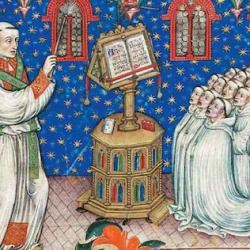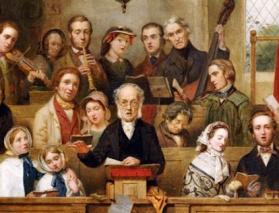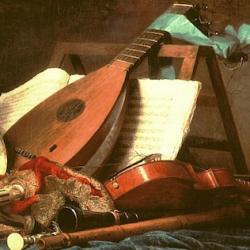In his encyclopedic and highly intelligent The Christian West and Its Singers: The First Thousand Years , Christopher Page details how the “soundscape” of Christendom expanded through the establishment of hospitals, many of which were supplied with service books that included notation (a fairly late innovation). He notes, “The statutes of hospitals were sometimes explicit about their musical provision. The clerics serving the Hotel-Dieu in Pontoise from 1265 were to sing Matins a notte and touttes les heures canonniales et la messe . . . a notte , while at Tours in 1263 the singers were commanded to read and sing according to the custom of the Church of St. Stephen. Foundation charters are usually more reticent, but there are occasional references to the provision that the founders or governors expected. At Cammin, in Pomerania, one hospital was staffed by a priest and a scolaris who were required to sing Mass but allowed to say the Hours and vigils sine nota .” He quotes a sketch of Dickens describing a 19th-century hospital scene, and adds, “The scene was perhaps not so different in many a larger medieval hospital as the sound of chant arose from the altar, the principal therapy available once urine had been tested, poultices applied and simples given out.” Musical therapy, medieval style.
It’s not specifically to do with music, but he adds . . . .
that “The inmates of some hospitals, especially of the leprosaria, formed semi-monastic communities living under a form of the Rule of Saint Augustine and waiting for release into a new life of eternal salus . When the thirteenth-century trouvere Baude Fastoul contracted leprosy and took leave of his friends in Arras, bound for the hospital of Grant Val, he spoke of himself as a pilgrim and even as a monastic solitary venturing en un desert .”
Page notes the divergence of modern and medieval conceptions of illness and cure: “Such meanings may seem strange today, not least because they imply a duty of penance and self-examination at a time of sickness rather than the absolute right to care and indulgence that is taken for granted in the modern developed world; nonetheless, pilgrimage and monastic withdrawal, in a context of daily liturgy, provided medieval sufferers with two of the most potent metaphors for giving meaning to the grave changes in their lives that sickness might enforce.” Sickness, in short, was a vocation, and the practically-minded medievals institutionalized the vocation.











